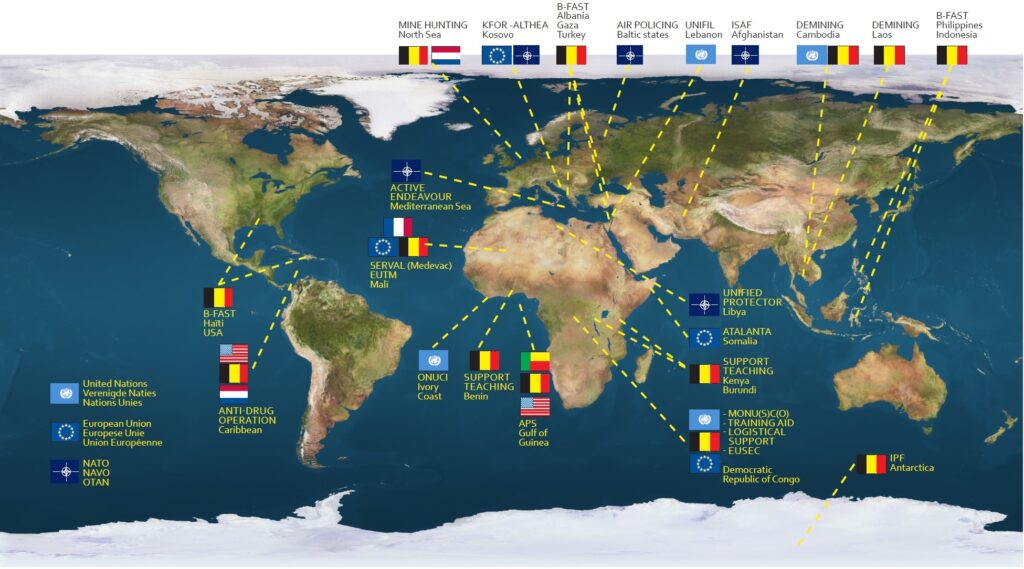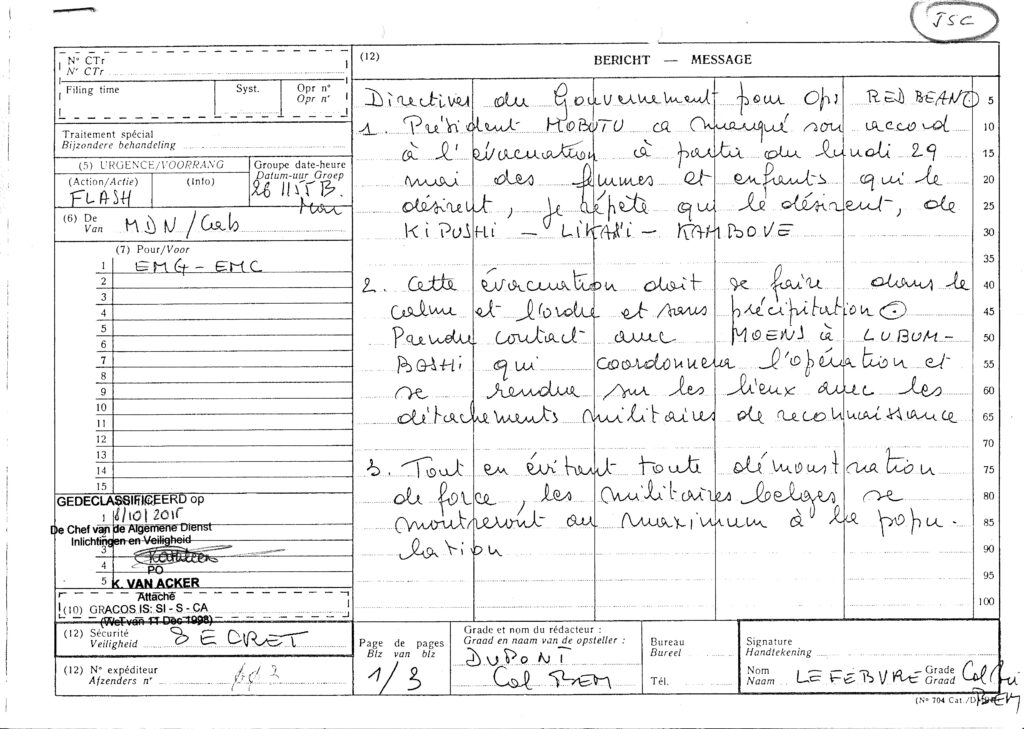| Previous page | Back to exhibition’s homepage | Next page |
| Contents: 1. Introduction 2. Central Africa 3. Afghanistan |
Introduction | Introduction | Introduction |
| The SGRS is involved in each phase of a potential operation carried out by the Land components, Mer, Air or Medical. | The SGRS is involved in each step of a potential operation conducted by the Land, Sea, Air or Medical Force. | In every phase of a possible operation by ground forces, marine, air force or medical teams, is ADIV involved. |
| We can distinguish different stages in which the SGRS plays a role : | The SGRS plays a role at several levels: | We distinguish different phases in which ADIV plays a role: |
- Monitoring of potential risk areas : the information collected is translated into studies, and briefings are given to the General Staff and other interested parties.
- Preparing for the political-military decision-making process : analysts provide studies for the various ministerial offices.
- Preparing for deployments : depending on the areas, contact and intelligence networks are activated, and agents are sent to the field.
- The schedule of operations : once the strategic framework has been established, detachments receive as much information as possible, managers are informed of security conditions, the various electronic defense systems are programmed…
- The execution of operations : detachments receive ongoing tactical and operational intelligence, and internal security and external threats are given special attention. The teams remaining in Belgium are kept informed of the situation.
- Closing of operations : the end of an operation always harbors a multitude of risks. Since then, the SGRS staff remain on site until the last moments and maintain maximum vigilance.
- The balance sheet : the operation is evaluated phase by phase in order to work more efficiently in the future and to avoid certain risks.
- Monitoring of potential risk areas: the collected information is transformed in studies, and the General Staff and other stakeholders are provided with briefings.
- Preparation of the politico-military decision-making process: the analysts provide the ministerial cabinets with studies.
- Preparation of deployments: where possible, the contacts and intelligence networks are activated, and agents are sent on site.
- Planning of operations: once the strategic framework is established, the detachments are supplied with as much information as possible, leading officers are briefed on the security environment, the many electronic defence systems are programmed…
- Execution of operations: the detachments receive continuous tactical and operational information, and particular attention is paid to internal security and external threats. The home front is kept informed of the situation
- End of operations: the end of an operation always comes with numerous risks. The SGRS personnel therefore stay alert and are present until the very last moments.
- Lessons learned: a phase-by-phase evaluation of the operation is made in order to work more efficiently in the future and avoid risks.
- The monitoring of possible risk areas: the information about this is translated into studies and briefings are given to the General Staff and other interested parties.
- The preparation of the political-military decision-making process: the analysts deliver a study for the various ministerial cabinets.
- Preparing for deployment: where possible, the contacts and intelligence networks are activated, intelligence agents are also sent to the scene.
- The planning of the operation: once the strategic framework has been determined, as much information as possible is given to the detachments, the cadres are informed about the security environment, the various electronic defense systems are being programmed…
- The execution of the operation: the detachments receive permanent tactical and operational intelligence, attention is paid to internal security and external threats. The home front is kept informed.
- Closing the operation: the end of an operation is always a risky moment, so that the ADIV staff is on site until the last moment and remains alert.
- Lessons learned: the operation is evaluated phase by phase in order to be able to work more efficiently in the future and to avoid risks.
Central Africa | Central Africa | Central Africa |
| After the independence of the Belgian Congo (30 june 1960) and two Ruanda-Urundi (1 july 1962), which led to the dissolution of the Force Publique, Belgium no longer has an organization on site, responsible for military intelligence and security. | After the independence of the Belgian Congo (30th June 1960) and Rwanda-Urundi (1st July 1962), which led to the dissolution of the Force publique, Belgium no longer possessed a local service responsible for the management of military intelligence and security. | After the independence of the Belgian Congo (30 June 1960) en Rwanda-Urundi (1 July 1962), resulting in the dissolution of the Public Defense Forces, Belgium no longer has an organization, locally responsible for military intelligence and security. |
After 1962, these are Belgium's priorities for Central Africa :
| After 1962, the priorities of Belgium with regard to Central Africa were the following:
| Already 1962 Belgium has the following priorities with regard to Central Africa:
|
| The General Intelligence Service is given an important role, since it must regularly transmit to the competent authorities the information collected, both strategically/operationally and operationally/tactically. These informations, as well as a permanent presence in the field, permit to drive, from Belgium, a number of armed rescue operations and to participate in international peacekeeping operations. | The General Intelligence Service was entrusted with a major role, i.e. providing the competent authorities with regular information pertaining to both the strategic/operational and the operational/tactical level. Thanks to this information and the permanent presence on site, it was possible to conduct several armed rescue operations from Belgium and to participate in international peacekeeping operations. | An important role is reserved for the General Intelligence Service, which regularly reviews the data it collects, both of a strategic-operational and of an operational-tactical nature, available to the competent authorities. Thanks to this information, and by being permanently present on site, is it possible to carry out a number of armed rescue operations from Belgium and to participate in a meaningful way in international operations in the field of law enforcement. |
| Furthermore, the General Intelligence Service assists the Belgian soldiers on the spot during technical support missions or training of military executives. | Moreover, the Service général du Renseignement also helped Belgian soldiers during operations implying technical assistance and training of military leading personnel. | In addition, the General Intelligence Service provides support to the Belgian military on site during the provision of technical assistance and the training of military cadres. |
Afghanistan | Afghanistan | Afghanistan |
| Following the attacks of 11 september 2001, the Bonn conference decides in December of the same year to set up an interim government in Afghanistan and to set up a new Afghan army. End December, the Belgian government gives the green light for Defense to participate in the International Security Assistance Force (ISAF). | In the aftermath of 9/11, the Bonn conference decided in December 2001 to install an Afghan interim government and to raise a new Afghan army. End December, the Belgian government gave the green light to the Defence to participate in the International Security Assistance Force (ISAF). | After the attacks of 11 september 2001 will be presented at the Bonn conference in December 2001 decides to put in place an Afghan Interim government and to establish a new Afghan army. At the end of the same month, the Belgian government gives the green light to Defense to participate in the International Security Assistance Force (ISAF). |
| End of 2002, the SGRS sets up a National Intelligence Cell (NIC) in Kabul. This cell is notably responsible for collecting all kinds of information concerning security on and around Kabul airport.. For this purpose, the NIC collaborates with sources and assesses the risk of a potential attack (When, by who, against who, comment). | End 2002, the SGRS established a National Intelligence Cell (NIC) in Kabul. This cell was responsible a.o. for the collection of intelligence regarding security in and around Kabul airport. To do so, the NIC worked with sources and investigated the risk of potential attacks (when, by whom, against whom, how). | ADIV install end 2002 a National Intelligence Cell (NIC) in Kabul. This cell includes. responsible for gathering all types of intelligence related to security at and around Kabul airport. To this end, the NIC does source work and investigates the risk of a possible attack (when, by who, against what, by which). |
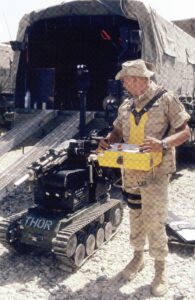 | 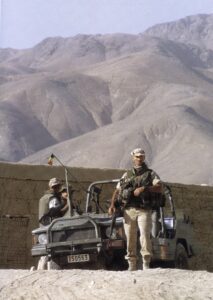 | 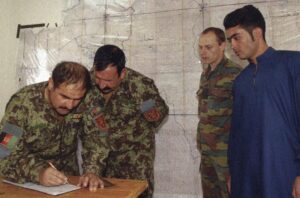 |
| Therefore, NIC provides intelligence on missiles targeting the airport from east and north Kabul. This information relates to the place of assembly of the missiles and the perpetrators of the attacks.. In light of this information, it is possible to take protective measures and think about ways to avert the threat. | For instance, the NIC provided intelligence on rockets fired on the airport from the eastern and northern part of Kabul. Intelligence concerned the assembly facilities of the rockets and the perpetrators of the attacks. This intelligence made it possible to adopt protective measures and to search ways to erase the threat. | For example, the NIC provides intelligence on the missiles fired at the airport from the East and North of Kabul. This information concerns where the missiles are located and by whom they are fired. Based on this information, protective measures are taken and ways to eliminate the threat are considered. |
| The SGRS is responsible for the protection of people deployed at ISAF HQ and provides intelligence to Belgian diplomats stationed in Kabul. | The SGRS was responsible for protecting the persons deployed in the ISAF HQ and providing Belgian diplomats in Kabul with intelligence. | ADIV also ensures the security of the people deployed at the ISAF Headquarters and provides intelligence to Belgian diplomats in Kabul. |
| Previous page | Back to exhibition’s homepage | Next page |
